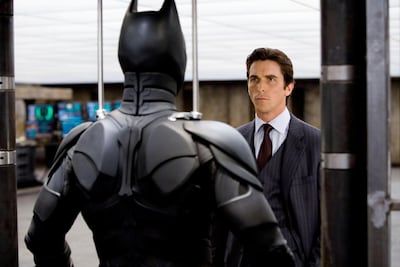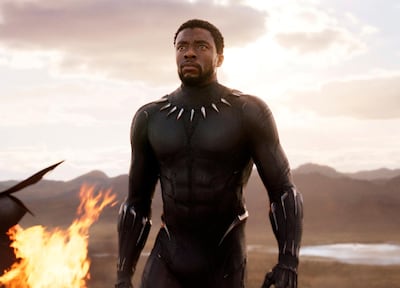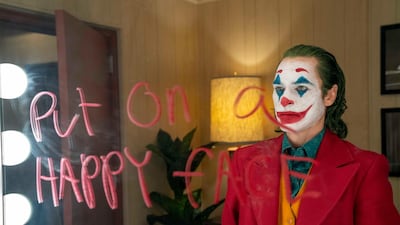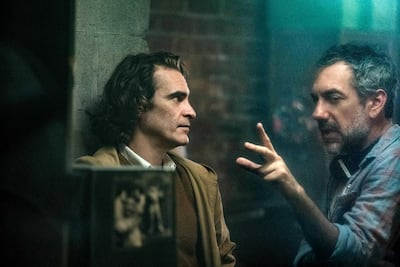Ever since its premiere at the Venice Film Festival at the end of August, Joker has dominated cultural conversations across the world. At first, these discussions were focused on the impressive reviews the film received. Then people began to talk about whether it was in the running for an Oscar. But lately the focus has been on the impact Joker's controversial content might have on audiences.
No other comic book movie has been greeted with such frenzied debate and discussion from such a wide variety of critics and commentators. And with early estimates suggesting Joker would make more than $100 million (Dh367.3m) at the box office in its opening weekend, despite only costing about $55m to make, there's a good chance it will encourage other filmmakers to make comic book movies that are similarly bold, grounded, original and risky.
That would likely be a huge relief for anyone left disappointed by recent films featuring comic book characters such as the Fantastic Four, Hellboy, X-Men, Superman and Batman, which have been criticised for feeling like pale imitations of the popular productions from the Marvel Cinematic Universe.
Why is 'Joker' so unique?
But what is it that makes Joker, which stars Joaquin Phoenix, feel so unique?
Production designer Mark Feinberg spotted its originality as soon as he read director Todd Phillips's script. It took a while, though, for Feinberg to actually sit down and look at it. He was so disinterested in working in the comic book genre again, having done so on 2014 film The Amazing Spider-Man 2, that he turned down Phillips's repeated invitations to join his crew. "I prejudged it," says Feinberg, who became hooked by the way Phillips and co-writer Scott Silver had figured out how to make a comic book movie that wasn't about "escaping our world" but "confronting it".
While Feinberg and costume designer Mark Bridges were attracted to the uniqueness of Joker, they say no one on set discussed the ways in which the film would be different to others from the genre. "We didn't talk about what we weren't doing," says Feinberg. "We talked about the cinema that inspired us."
For Feinberg, this meant focusing on movies by Martin Scorsese, especially as the director's hits Taxi Driver and The King of Comedy were major influences on Phillips. Bridges says he studied the work of New York photographers from the 1980s who were able to "capture loneliness in a crowd" in their pictures.
Joker isn’t the first comic-book movie to be so serious
All of these influences combine to give Joker a depth, seriousness and pathos that means it has more in common with the American New Wave movement of the 1970s, during which filmmakers such as Steven Spielberg, George Lucas, Francis Ford Coppola and Scorsese burst on to the cinematic scene, than the modern blockbuster.

But Joker isn't the first comic book movie to approach its subject matter in such a dark, serious and thought-provoking manner. Christopher Nolan's Dark Knight trilogy, which consisted of Batman Begins, The Dark Knight and The Dark Knight Rises, was hugely successful with this approach, as was 2017's Logan, in which director James Mangold oversaw Hugh Jackman's emotional farewell as X-Men character Wolverine.
For Sean O'Connell, managing director of entertainment news outlet CinemaBlend and co-host of the ReelBlend podcast, these movies worked because they treated their "mature source material with respect", as Nolan, Mangold and Phillips didn't "cut corners to water down their subject matter".
The fact the comic book movies have never been as popular means that there should be more and more opportunities for directors to do something different with the genre. Not only did Avengers: Endgame become the highest-grossing film of all time, but O'Connell says a superhero or comic book movie has been released almost every month this year.

With so many characters and sequels to explore, O'Connell says he hopes Joker will "empower studios to take more risks on projects that don't seem like safe, four-quadrant crowd-pleasers in the comic book realm". He also says that Joker stands out because it "isn't trying to set up another movie, or continue a story that was handed to it by a separate filmmaker". Instead, it is "a stand-alone story with a clear beginning and a distinct ending".
What’s the future for the genre?
Feinberg suggests there is unlikely to be a Joker sequel. "The one thing that really attracted me to Joker was that Todd wasn't interested in doing a franchise. He wanted to make a one-off," he explains. He also says that if Phillips and Warner Bros were to franchise anything from Joker it would be the "origin stories of how people get to the level of being two-dimensional or comic book characters".
That plan has been teased already by Phillips in an interview with Empire. The director has told Warner Bros that they should find "great filmmakers" to make comic book movies made on $30m budgets, with no CGI. He wants them to strip away everything that has defined the genre in the wake of Marvel's success. "Instead of trying to live in the shadow of the beast [the MCU], let's do something they can't," he says in the interview. "It'll be liberating."
Marvel isn't simply basking in its triumphs, though. After the success of Black Panther and Captain Marvel, the studio is looking to introduce more diverse characters into the MCU, while The Eternals, Shang-Chi and the Legend of the Ten Rings and Doctor Strange in the Multiverse of Madness all promise to be even more visually arresting, surreal and cosmic than the 23 previous instalments to the cinematic behemoth. Disney's acquisition of 20th Century Fox also means that it has the small matter of bringing Blade, the Fantastic Four and the X-Men into the fold.
After dominating the box office for the best part of 20 years, the comic book genre still shows absolutely no signs of slowing down. Instead, it looks as though it is about to begin a new chapter, one that doesn't only have the potential to take the films to new artistic heights, but had might even please cinema-goers who have previously dismissed these films.


